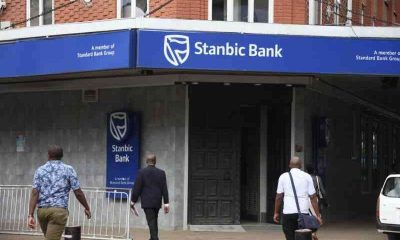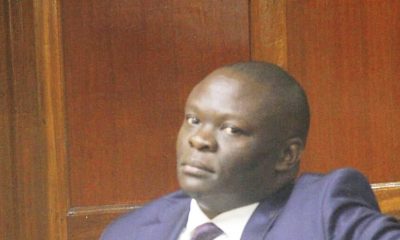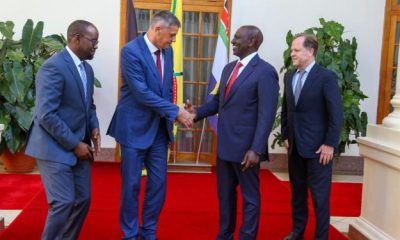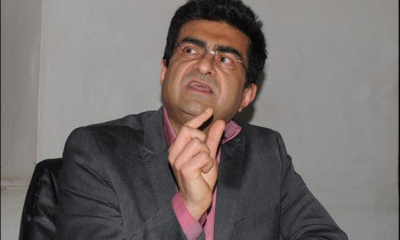Investigations
State Links EIS Afrika Group to Complex Criminal Syndicate in Multi-Million Shilling Money Laundering Scheme

Kenya’s Asset Recovery Agency (ARA) has launched a high-profile legal battle to seize Sh35 million allegedly tied to the EIS Afrika Group Ltd, unraveling a web of deceit that links the company to a sophisticated money laundering syndicate.
Court documents reveal shocking details of forged communications, phantom contracts, and a brazen attempt to exploit Kenya’s financial systems to legitimize illicit funds.
ARA’s Case: Funds “Clearly Proceeds of Crime
In a hearing before Justice Lucy Njuguna, the ARA argued that EIS Afrika Group, purportedly operated by foreign nationals, failed to account for the origins of Sh35 million held in Kenyan accounts. The agency asserts the funds were laundered through a maze of transactions designed to obscure their criminal origins.
“The evidence overwhelmingly shows these funds were illegitimately acquired,” the ARA stated, citing Section 92(1) of the Proceeds of Crime and Anti-Money Laundering Act (POCAMLA).
Under the law, the court can order forfeiture if assets are deemed proceeds of crime on a “balance of probabilities”—a threshold the ARA claims to have met.
Key to the case is EIS Afrika’s inability to rebut the allegations. Investigators highlighted the group’s reliance on a fabricated World Bank contract to justify the funds, a claim dismantled by digital forensics.
The Phantom World Bank Connection
Central to EIS Afrika’s defense was an alleged contract with the World Bank’s Burundi branch, supported by an email address—[email protected]—provided by the group’s director, Nduwimana Aimable.
However, the Communications Authority of Kenya (CAK) exposed the ruse.
A CAK report dated May 7, 2024, revealed the email had no identifiable owner and was accessed repeatedly from Nairobi’s Parklands and Nairobi River areas—far from the World Bank’s official channels. Though the address was linked to Google services, its digital footprint pointed to local manipulation.
“This email is a hoax crafted to mislead the court and disguise the funds’ origin,” said ARA investigator Alfred Musalia. He emphasized that EIS Afrika produced no authentic World Bank documents, calling the group’s narrative “a tapestry of lies.”
Kenya as a Laundering Hub
The ARA’s filings accuse EIS Afrika of exploiting Kenya’s financial infrastructure to “invest” laundered assets, a tactic increasingly common among transnational syndicates. While the group’s operations beyond Kenya remain under scrutiny, investigators suspect broader networks.
“Such schemes rarely operate in isolation,” said financial crime analyst Wanjiku Mwangi. “Fake contracts and spoofed emails are hallmarks of syndicates that span borders, leveraging weak regulatory gaps.” Though direct links to other crimes are yet unproven, the ARA’s findings suggest EIS Afrika’s Kenyan activities may be a node in a larger criminal ecosystem.
Legal Precedent and Regional Implications
If forfeiture is granted, the case could set a benchmark for prosecuting complex money laundering networks in East Africa. The ARA’s reliance on digital evidence—such as geolocated email access—highlights evolving tactics to combat financial crime.
Justice Njuguna’s impending ruling is being closely watched. A victory for the ARA would signal Kenya’s tightening grip on illicit flows, while a setback could embolden syndicates.
A Syndicate Unmasked
The EIS Afrika case lays bare the audacity of modern financial criminals—and the vulnerabilities they exploit. As authorities piece together the group’s operations, questions linger: Who orchestrated the fake World Bank scheme? Are other institutions implicated?
For now, the Sh35 million remains frozen, a symbol of Kenya’s resolve to dismantle shadowy syndicates. But as Musalia warned, “This is just one thread in a much larger web.”
Kenya Insights allows guest blogging, if you want to be published on Kenya’s most authoritative and accurate blog, have an expose, news TIPS, story angles, human interest stories, drop us an email on [email protected] or via Telegram
-

 Grapevine1 week ago
Grapevine1 week agoAlleged Male Lover Claims His Life Is in Danger, Leaks Screenshots and Private Videos Linking SportPesa CEO Ronald Karauri
-

 Lifestyle1 week ago
Lifestyle1 week agoThe General’s Fall: From Barracks To Bankruptcy As Illness Ravages Karangi’s Memory And Empire
-

 Grapevine3 days ago
Grapevine3 days agoRussian Man’s Secret Sex Recordings Ignite Fury as Questions Mount Over Consent and Easy Pick-Ups in Nairobi
-

 Investigations2 weeks ago
Investigations2 weeks agoEpstein Files: Sultan bin Sulayem Bragged on His Closeness to President Uhuru Then His Firm DP World Controversially Won Port Construction in Kenya, Tanzania
-

 News2 weeks ago
News2 weeks agoAUDIT EXPOSES INEQUALITY IN STAREHE SCHOOLS: PARENTS BLED DRY AS FEES HIT Sh300,000 AGAINST Sh67,244 CAP
-

 Business2 weeks ago
Business2 weeks agoKRA Can Now Tax Unexplained Bank Deposits
-

 Investigations1 week ago
Investigations1 week agoEpstein’s Girlfriend Ghislaine Maxwell Frequently Visited Kenya As Files Reveal Local Secret Links With The Underage Sex Trafficking Ring
-

 News1 week ago
News1 week agoState Agency Exposes Five Top Names Linked To Poor Building Approvals In Nairobi, Recommends Dismissal After City Hall Probe




























